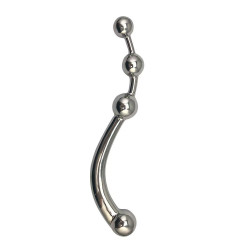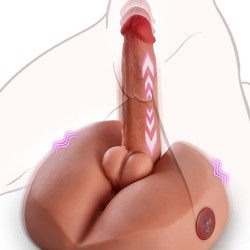
Orgasm Denial?!! It's More Fun Than You Might Think
Denial of orgasm is not limited to kinksters. You can use it on your own or to improve your relationship!
There are numerous health advantages of orgasms. They help relieve stress, strengthen the immune system, combat sleeplessness, and may even lower the risk of prostate cancer. Orgasms feel amazing even without all these benefits. It makes sense why so many of us are searching for orgasms that are better, bigger, and more often.
Therefore, why would anyone want to deprive himself of all these wonderful things? Shouldn't having fewer orgasms be bad if having many is healthier for us? Not always. Denial of orgasms can have unexpected advantages.
What Is Orgasm Denial?
Orgasm denial isn't simply avoiding all things sexy all the time. Most of the time, it includes a tightly regulated sexual element, typically in the form of anticipation. One partner can maintain control while the other submits and abides by their rules in one of the more popular forms of orgasm denial for couples. Limits and wants are discussed in advance, and the submissive agrees to the terms of the dominant's authority, just like in any other kind of power exchange relationship.
Total denial and tease and denial are the two primary forms of orgasm denial. Either a short-term or long-term approach can be used for each.
Total Denial
Chastity is the term used in the kink community to describe the most iconic instance of complete rejection. It could be necessary for the submissive partner to wear a chastity device to make sure they refrain from having sex. In other situations, the submissive merely makes a long-term commitment to abstain from sexual activity. Regardless of whether a real locking chastity device is used, the dominant is frequently called the keyholder.
Usually, this kind of orgasm denial is carried out continuously over a more extended period. The dominant determines the extent to which the refused partner must abstain from sexual activity. For example, the submissive may be prohibited from all forms of intercourse for brief or extended periods, prohibited from masturbating entirely, or permitted to masturbate only with the consent of the dominant. The submissive may decide to utilize a chastity device that also inhibits erection if they have a penis.
Tease and Denial
With this method, the dominant arouses the submissive and then stops shortly before orgasm, as opposed to forbidding any sexual activity. In a stand-alone session, tease and denial can be used to allow the submissive to cum after being repeatedly rejected. This method is frequently called edging. Denial and tease can also be applied over an extended length of time. It is not unusual for dominants who are in charge of 24/7 denial to almost induce orgasm in their submissive spouse before stopping stimulation for several hours or days. (Life on the Edge: Edging and Why You Deserve It has more information on this.)
Orgasm Denial Is Not Necessarily a BDSM Activity
It's not always the case, even if these kinds of orgasm denial seem to be kink-focused, particularly when chastity devices and dominant/submissive power dynamics are involved. Orgasm denial doesn't need to function inside the parameters of conventional BDSM. Some people may instead approach orgasm denial in a more subdued, spiritual, tantra-like manner. This community favors Karezza, a specific type of complete orgasm withholding. Instead of one person controlling the other, Karezza entails evenly denying orgasms to both. Some people also engage in solo orgasm denial.
But Why!? Isn't Orgasm Denial Annoying?
Although it is logical to suppose that those who are drawn to sadomasochistic pursuits may find pleasure in the torment of orgasm suppression, this is not the only demographic. Many discover that it increases arousal and eventual release due to the intense sexual tension it produces. It's an excellent tool for people in committed relationships who want to revive their sexual drive. For people with reduced sex drives, orgasm withholding can increase desire and prolong foreplay. Additionally, it can make orgasms stronger and more amazing than they were when they finally occur. If someone with a penis wants to improve their endurance and long-term power, denying them an orgasm can teach them how to manage their climax and wait longer.
Many couples discover that orgasm suppression makes them feel more present and connected during sex and promotes connection with their spouse. Those who emphasize the power play dynamic may find this particularly true. In any situation, playing with dominant/submissive control can make both parties feel more committed and devoted.
Some people even decide to employ orgasm control as a therapeutic tool. Consider the following situation:
Taylor always felt bad about looking at porn and masturbating. They may have had that perspective because of their religious upbringing, but even as adults, they are unable to overcome the shame and guilt that come with self-gratification. Taylor has been able to reframe masturbation and disentangle it from ingrained shame by letting their boyfriend, Alex, manage their orgasms. Now, it's a good thing when Alex lets Taylor masturbate. Sometimes, it's just a treat, and other times, it's a prize for a well-done job. In any case, it doesn't feel as embarrassing when Taylor masturbates to comply with Alex's commands. Is it possible that it's done to appease someone else? Maybe the fact that Taylor doesn't have to develop the idea makes it seem more acceptable. In any case, Taylor is experiencing shame-free masturbation for the first time, and it's fantastic.
Another incentive strategy is orgasm control. It can assist someone who struggles to start specific chores or maintain concentration until they are finished. What if your dominant only let you cum after you've cleaned the living room, completed your taxes, or gone to the gym like you said you would? That's a terrific technique for some people to cross items off their to-do list. Furthermore, it's great to prevent your spouse from climaxing until you've had your orgasm, especially when the dominant partner takes a long time to do so.
How Should You Start?
Why not start cautiously with brief time increments if you haven't tried orgasm denial before? During a single masturbation session, you can decide to push yourself toward an eventual climax gradually. Maybe once you've finished specific duties, your partner can make you earn the right to have an orgasm. You can discover that orgasm denial enhances your sex play with erotic anticipation, which makes the orgasms you do experience much more pleasurable, regardless of how you choose to play it out.















































